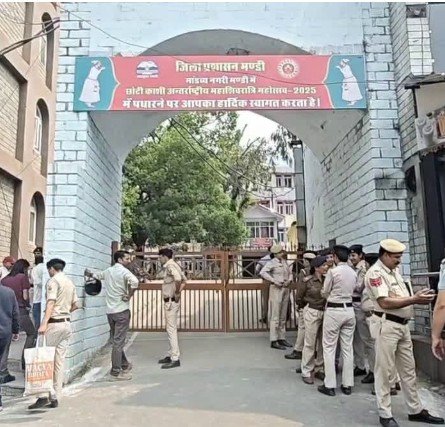
Echoes of Baishakhi: Jallianwala Bagh and the Wounds That Never Healed
- Breaking NewsHEADLINESNATIONOpinion
- April 12, 2025
- No Comment
- 51
Saptrishi Soni: On the sacred day of Baishakhi, April 13, 1919, thousands of Indians gathered peacefully at Jallianwala Bagh in Amritsar. Many were there to celebrate the harvest festival, while others had assembled to register their protest against the repressive Rowlatt Act imposed by the British colonial government. The air was filled with both festivity and fervent patriotism. But by sunset, the ground was soaked in blood, and the voices of celebration were silenced forever.
Brigadier General Reginald Dyer, leading British troops, sealed the only exit of the walled garden and ordered open fire on the unarmed crowd without any warning. For ten horrifying minutes, 1650 rounds were fired into the helpless mass of men, women, and children. There was no escape, no mercy, no justification — only cold, calculated violence carried out under the guise of maintaining order. Hundreds died instantly; many more succumbed to their wounds in the days that followed. Families were shattered, dreams destroyed, and a collective scar was etched into the soul of India that continues to ache more than a century later.
Jallianwala Bagh was not just a massacre. It was a moment that shook the conscience of an entire nation and laid bare the brutal face of imperialism. The Punjab bore the brunt of this atrocity, but the grief and humiliation were shared by every Indian, from every province and walk of life. It turned loyalty into rebellion, silence into slogans, and a subdued population into a resolute movement for independence.
And yet, the most haunting part of this tragedy is not just the massacre itself, but the lack of remorse that followed. No apology has ever been offered by the British Crown — not by Queen Elizabeth during her 1997 visit to the site, nor by King Charles or any British Prime Minister, despite repeated calls for one. There has never been a formal acknowledgement of guilt, no reparation, no expression of genuine sorrow. The cold indifference of the former empire to this horror only deepens the wound, reminding India that even the most egregious crimes of colonialism can be whitewashed by silence.
Jallianwala Bagh is more than a historical site; it is a moral landmark. The massacre is not just a brutal event from the past, but a mirror in which we must constantly examine our present. In a world where peaceful dissent is again being criminalized, where protest is increasingly met with state violence, and where questioning authority is seen as subversive, the ghosts of Jallianwala whisper caution. The authoritarianism that fueled General Dyer’s action did not die with the end of British rule. It lurks wherever power becomes unaccountable and truth inconvenient.
What happened in Amritsar on that Baishakhi afternoon was a crime against humanity, a violation of the most basic civil rights. It was also a turning point in India’s freedom struggle — a moment when many who still believed in British justice finally woke up to the tyranny of colonial rule. Rabindranath Tagore renounced his knighthood. Mahatma Gandhi launched the Non-Cooperation Movement. Bhagat Singh, then a boy of 12, visited the blood-soaked garden and found his revolutionary spirit ignited. A new India was born in that tragedy — one no longer willing to be ruled, one that would fight back with its voice, its will, and its sacrifices.
Yet today, as we commemorate this dark chapter, there is a danger in reducing it to a mere annual ritual. If we only remember Jallianwala Bagh through museum exhibits, LED-lit memorials, or as a selfie backdrop for tourists, we risk stripping it of its urgent relevance. That garden must remain a living reminder — not just of colonial brutality, but of the cost of silence and the consequences of unchecked power.
The language of oppression may have changed, but its spirit lingers. Whether through internet blackouts, repression of student voices, or the criminalisation of dissent, we are once again confronted with the question: how do democracies die? Often, not with the roar of tanks, but in the silence that follows when citizens are too afraid to ask questions. The memory of Jallianwala Bagh should compel us to speak up — not just in remembrance of those who died, but in defense of the values they were killed for.
It is our duty, as inheritors of this history, to preserve not only the facts of that day, but also its moral imperative. Children in India must learn about Jallianwala Bagh not just as a tragic tale of the past, but as a warning sign for the future. The lesson is not merely that British colonialism was cruel — that much is obvious. The deeper truth is that any government, anywhere, that fears its people’s questions, that criminalizes peaceful protest, and that celebrates brute force over dialogue, risks becoming another Dyer in disguise.
Jallianwala Bagh still echoes with the cries of the innocent. And in those echoes lies a question for every Indian, every believer in democracy, and every defender of freedom — will we remember just the horror, or will we also heed the warning?
The answers we give today will determine whether such history remains behind us, or whether, in new forms and faces, we are doomed to repeat it.
#JallianwalaBaghMassacre #BritishColonialAtrocities #NeverForgetJallianwala #IndiaHistory #DemocracyAndDissent



